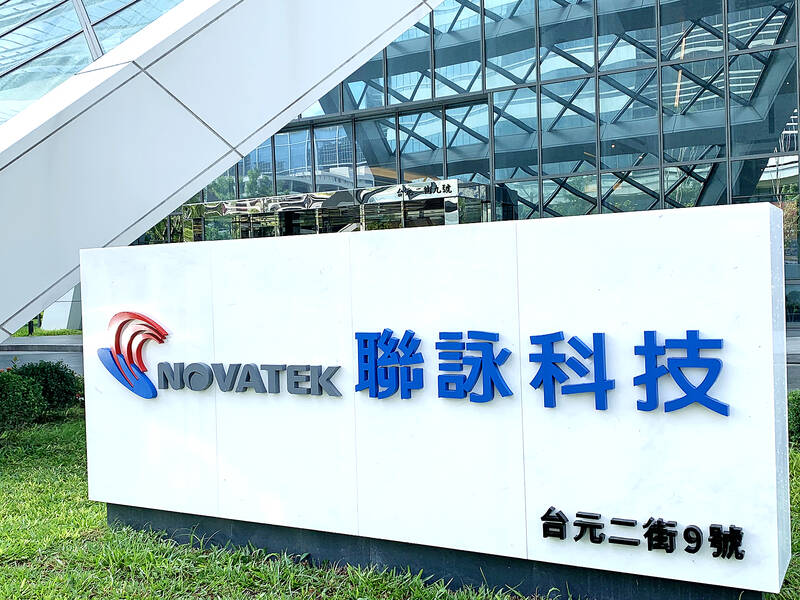Novatek Microelectronics Corp (聯詠), which specializes in driver ICs for displays, forecast that revenue would either be flat or increase by up to 4.4 percent sequentially to between NT$24.4 billion and NT$25.5 billion (US$752 million and US$786 million) this quarter, mainly due to restocking demand for TV chips in preparation for the shopping festival in China and global sports events, including the Paris Olympics.
“The [semiconductor] industry’s inventory has returned to healthy levels following more than one year of adjustments. Now all eyes are on how fast consumer electronics demand would pick up,” Novatek president Steve Wang (王守仁) told an online investors’ conference on Tuesday.
“As global macroeconomic uncertainty and geopolitical conflicts persist, we are seeing a slow recovery in consumer electronics demand. Since three of the world’s major international sports events, including the Paris Olympics, are around the corner, customers are restocking TV chips more actively. China’s 618 [June 18] sales promotions also help,” he said.

Photo: Grace Hung, Taipei Times
TV chips were the biggest revenue contributor last quarter, accounting for 39 percent of the total, the chip designer said.
Demand for driver ICs used in notebook computer displays would be flat this quarter, but Novatek has detected early signs of a pickup next month, and demand for driver ICs for gaming monitor displays would remain resilient, Wang said.
However, demand for driver ICs for small displays, mainly for smartphones, would remain sluggish this quarter, he said.
The company would adopt 22-nanometer technology for touch and display driver integration (TDDI) chips for OLED displays, matching customers’ specification upgrades, Wang said.
Speculation has emerged that Novatek would deploy Taiwan Semiconductor Manufacturing Co’s (台積電) 22-nanometer technology to produce TDDI for OLED displays, rather than its long-term foundry partner United Microelectronics Co (UMC, 聯電). UMC holds a 2.7 percent stake in Novatek.
The company expects a better growth momentum in the second half of this year, when it is to supply OLED display ICs to new customers, he said.
Novatek reported better-than-expected 41.09 percent gross margin last quarter, but expects the figure to slide to between 38.5 and 40.5 percent this quarter.
The company said that higher income for engineering design services for customers — known as non-recurring-engineering (NRE) income — and a better product portfolio helped boosted gross margin in the past quarter.
Novatek expects NRE income to grow this year from NT$880 million last year, thanks to rising demand for tailored-made TV chips, Wang said.
The company participated in Arm Holdings PLC’s design ecosystem in February as part of its plan to expand its application-specific IC (ASIC) business, but does not expect revenue contributions from this partnership in the near term, it said.

‘SWASTICAR’: Tesla CEO Elon Musk’s close association with Donald Trump has prompted opponents to brand him a ‘Nazi’ and resulted in a dramatic drop in sales Demonstrators descended on Tesla Inc dealerships across the US, and in Europe and Canada on Saturday to protest company chief Elon Musk, who has amassed extraordinary power as a top adviser to US President Donald Trump. Waving signs with messages such as “Musk is stealing our money” and “Reclaim our country,” the protests largely took place peacefully following fiery episodes of vandalism on Tesla vehicles, dealerships and other facilities in recent weeks that US officials have denounced as terrorism. Hundreds rallied on Saturday outside the Tesla dealership in Manhattan. Some blasted Musk, the world’s richest man, while others demanded the shuttering of his

TIGHT-LIPPED: UMC said it had no merger plans at the moment, after Nikkei Asia reported that the firm and GlobalFoundries were considering restarting merger talks United Microelectronics Corp (UMC, 聯電), the world’s No. 4 contract chipmaker, yesterday launched a new US$5 billion 12-inch chip factory in Singapore as part of its latest effort to diversify its manufacturing footprint amid growing geopolitical risks. The new factory, adjacent to UMC’s existing Singapore fab in the Pasir Res Wafer Fab Park, is scheduled to enter volume production next year, utilizing mature 22-nanometer and 28-nanometer process technologies, UMC said in a statement. The company plans to invest US$5 billion during the first phase of the new fab, which would have an installed capacity of 30,000 12-inch wafers per month, it said. The

Taiwan’s official purchasing managers’ index (PMI) last month rose 0.2 percentage points to 54.2, in a second consecutive month of expansion, thanks to front-loading demand intended to avoid potential US tariff hikes, the Chung-Hua Institution for Economic Research (CIER, 中華經濟研究院) said yesterday. While short-term demand appeared robust, uncertainties rose due to US President Donald Trump’s unpredictable trade policy, CIER president Lien Hsien-ming (連賢明) told a news conference in Taipei. Taiwan’s economy this year would be characterized by high-level fluctuations and the volatility would be wilder than most expect, Lien said Demand for electronics, particularly semiconductors, continues to benefit from US technology giants’ effort

MULTIFACETED: A task force has analyzed possible scenarios and created responses to assist domestic industries in dealing with US tariffs, the economics minister said The Executive Yuan is tomorrow to announce countermeasures to US President Donald Trump’s planned reciprocal tariffs, although the details of the plan would not be made public until Monday next week, Minister of Economic Affairs J.W. Kuo (郭智輝) said yesterday. The Cabinet established an economic and trade task force in November last year to deal with US trade and tariff related issues, Kuo told reporters outside the legislature in Taipei. The task force has been analyzing and evaluating all kinds of scenarios to identify suitable responses and determine how best to assist domestic industries in managing the effects of Trump’s tariffs, he